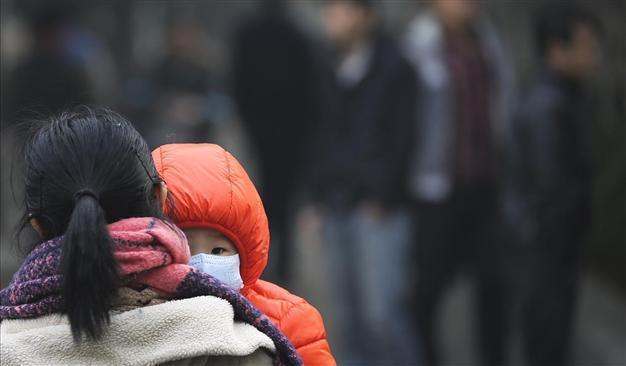China insists rich nations must do more at Lima climate meeting
BEIJING

A woman carries a toddler wearing a mask to protect from pollutants on a street during a hazy day in Beijing, Nov. 19. AP Photo
Developed countries must do more than their less wealthy counterparts to tackle climate change, the world's biggest polluter China said Nov. 25, reaffirming its longstanding position before a United Nations climate conference next month.
The meeting, to be held in the Peruvian capital Lima from December 1 to 12, is intended to pave the way for a global deal on cutting Earth-warming carbon emissions to be agreed next year in Paris as a replacement for the Kyoto treaty.,
China earlier this month set a target for its emissions to peak around 2030, the first time it has declared a date, albeit approximate, for the goal.
"Developed countries... should continue to take the lead in cutting emissions by large margins and at the same time provide developing countries with support for financing, technology and capability building," Su Wei, Beijing's top climate negotiator and a senior official of the National Development and Reform Commission (NDRC), told reporters.
China hopes the Lima conference and next year's agreement will uphold the principles of "common but differentiated responsibilities" in tackling climate change, he told a briefing.
The phrase calls on developed nations - with their long industrial history - to take the lead in addressing global environmental issues such as curbing emissions.
That insistence was central to the failings of the 2009 Copenhagen climate summit as developed nations baulked at taking the bulk of the responsibility.
Developed countries are wealthier and have greater capabilities, while economic growth and poverty alleviation remain "the most urgent priorities" of developing states, said Su, whose organisation is China's top economic planning agency.
The Chinese emissions goal was announced during a visit to Beijing by US President Barack Obama, who set a target at the same time for the US to cut its emissions by 26-28 percent from 2005 levels by 2025.
Xie Zhenhua, an NDRC vice-chairman, declined to be drawn when asked if China's emissions could peak before 2030, saying there were "a lot of uncertainties" in the intervening 16 years.
But Su said China as a developing nation would make "more powerful efforts after 2020" to make its "due contribution" to reducing global warming.
China's more than three decades of economic expansion have been accompanied by a marked rise in pollution and Beijing's smog-ridden skies have sparked mounting public concern and anger.
Authorities in the capital and neighbouring areas imposed tight limits on car use, ordered factories to close, and gave public-sector employees a six-day holiday to clear the air for an Asia-Pacific Economic Cooperation (APEC) forum earlier this month, a temporary phenomenon that was dubbed "APEC blue."
